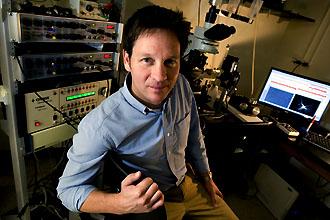Top Award for Young Scientist
Tulane neurobiologist Benjamin Hall has received a National Science Foundation Career Award. Over the next five years, the grant will provide $920,000 in funding for Hall"s laboratory research and his work with undergraduate students in the sciences.
“This is an award specifically for young professors just starting their careers,” says Hall, an assistant professor of cell and molecular biology who has been at Tulane for two years.
The awards are granted to young faculty who not only show exceptional promise in research, but also creatively integrate their research with undergraduate teaching.
Hall"s own laboratory research in neurobiology is focused on learning how synapses the minute gaps between nerve cells develop in mammalian brains, and how the incorrect development of synapses may play a role in the genesis of disorders such as autism and schizophrenia.
One opportunity that inspired Hall when he was a student was attending a neurobiology course at a marine biology research station. “These courses are intense training sessions,” he says. “The students see the research, they learn through lectures, and then they spend their afternoons and evenings in the lab doing hands-on work.”
Hall proposed as the instructional part of his grant to set up a training course at the Louisiana Universities Marine Consortium, a research station in the wetlands near Cocodrie, La. Key to Hall"s proposal was the inclusion of students from Louisiana colleges without graduate programs in biology.
“If you want to train students in biotechnology to either go on to medical degrees or Ph.D.s, or even to fill biotech positions in Louisiana, we really need to create ways to bring those students into the biotechnical disciplines and help them to succeed,” says Hall.
Teaching the basics of neurobiology at a marine station is historically appropriate, says Hall. “The history of neurobiology and marine biology are closely intertwined,” he says. “Many Nobel Prize winners in neurobiology did work on marine invertebrates.”

